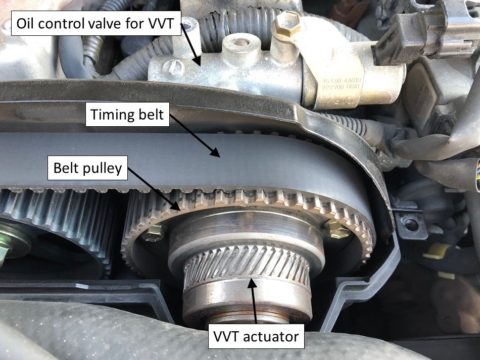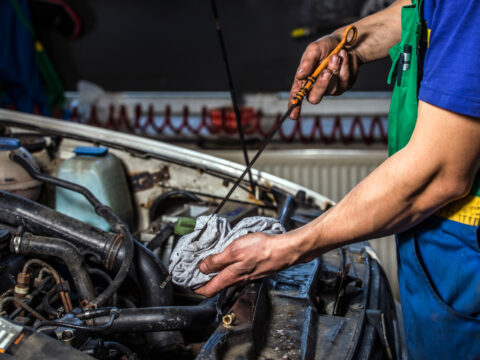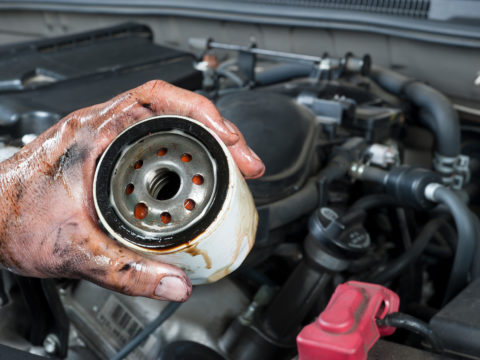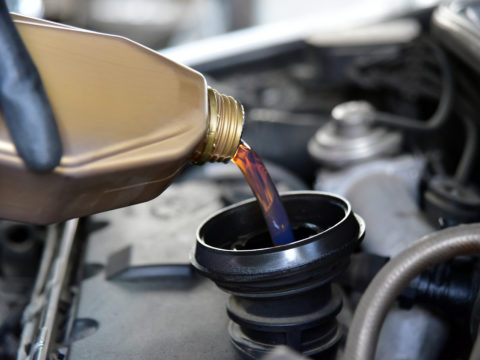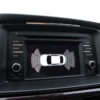One cause of engine damage is high oil pressure. Ignoring it can damage your engine. The trick is figuring out if you have high oil pressure and then what to do about it.
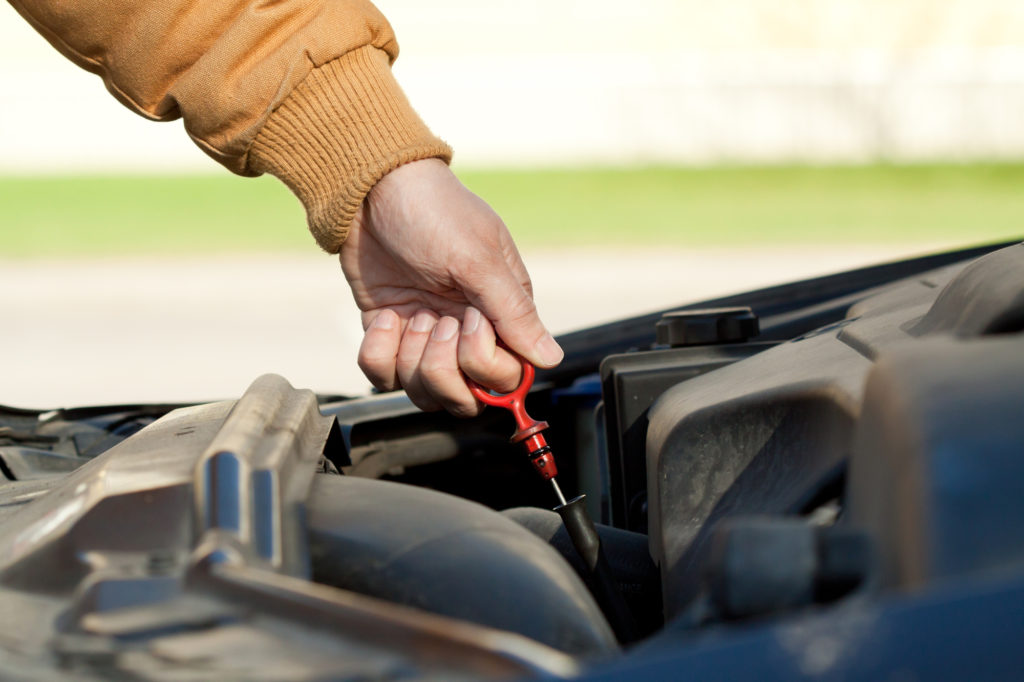
High engine oil pressure is likely nothing but a malfunctioning gauge issue. It can, however, be a symptom of something very wrong with your engine. There are steps you can take and tests you can run, but the best approach is to take it to a professional mechanic and have them try and fix your vehicle’s issues.
Here is what high oil pressure means for your vehicle and how to fix it.
Contents
What Does It Mean When You Have High Oil Pressure?
The oil pressure in your engine is much like human blood pressure. Over time, plaque builds up in your blood vessels, and that increases blood pressure. Untreated, high blood pressure can cause a heart attack or a need for bypass surgery.
In an engine, debris builds up, restricts hoses and valves, and increases oil pressure. Left untreated, excessive oil pressure can damage the engine, cause engine failure, and even kill the engine.
What is Considered High Oil Pressure?
Ideal oil pressure for all vehicles is between 20 and 80 pressure per square inch (PSI.) Getting an exact measurement is difficult because every vehicle has different PSI requirements. Any PSI over 80, however, is considered high.
Why is High Oil Pressure Bad?
High oil pressure is not an automatic indicator that something is broken or about to break. In some engines, a transition period the engine is going through can cause temporary high oil pressure. If high oil pressure persists, it can be an indicator of some other problem.
6 Symptoms of High Oil Pressure
There are multiple causes of high engine oil PSI, and there are multiple symptoms that indicate high PSI is an issue. Sometimes, though, only one or two symptoms will emerge. Occasionally, there will be no symptoms. The possibility of there being no symptoms is another reason why having a mechanic maintain your vehicle is a good idea.
1) Lack of Speed or Acceleration
If your vehicle is not picking up speed like it should or not accelerating as fast as it should, it could indicate high engine oil PSI.
2) Sputtering
Dirty oil filters can cause the engine to sputter and affect acceleration and speed. Generally, this is an indicator of a bad oil filter.
3) Friction Sounds
Your engine can make sounds of parts grinding when oil levels are low. The lower oil level can result in high oil PSI. If you hear grinding, pull over immediately.
4) Exhaust Discoloration and Burnt Oil Smells
When your engine leaks oil, your exhaust will be dark and sooty. You will also smell burning oil as it passes through your exhaust system. The causes could be a blockage, cracked or broken seals, etc. You should have your vehicle checked out by a professional.
5) Check Oil Light Appears
If the light on your dashboard that tells you to check the oil comes on, it may not be indicating that you are low on oil. It could also show up if the oil pressure is too high.
6) Oil Leaks
Check under your car to see if anything is leaking out of it because this is always a sign that something could be wrong. High oil pressure is one of the reasons oil could be leaking out of a vehicle.
What Causes High Oil Pressure in a Car?
There are several possible causes of high oil PSI.
1) New Engine
New engines tend to run at a higher PSI than engines that have a lot of miles on them. This is because everything is tight on a new engine, whereas an older engine has wear and tear and loosens up a bit.
As an engine gets miles on it, it loosens, and oil pressure drops.
2) Damaged or Malfunctioning Oil Pressure Sending Unit
A damaged or malfunctioning Oil Pressure Sending Unit is usually the issue with a high oil PSI reading. The Oil Pressure Sending Unit controls the gauge and associated lights you see on your vehicle’s dashboard. With age, the Oil Pressure Sending Unit degrades and sends less accurate readings to the pressure gauge.
The risk is that your vehicle does have a problem, but you have no way of knowing how serious it is.
3) Dirty or Damaged Oil Filter
Your oil filter can get clogged with use. A clogged filter restricts oil flow to your engine and causes high oil PSI.
4) Poor Quality Oil
The oil you use in your vehicle can affect oil PSI. Thicker oil can increase the PSI in your engine. Additionally, the quality of oil you use can affect your engine’s oil PSI. It increases PSI over time with use as the oil breaks down.
5) Blocked Oil Passage
As dirt and debris build up in an engine, it can clog various oil passages. Clogged oil passages restrict oil pressure flow and raise the PSI as well as hinder the lubrication of the rest of the engine, which can lead to overheating and engine failure. Prolonged blockage can also affect seals and the camshaft assembly, leading to leakage.
6) Defective Pressure Relief Valve
Your engine’s pressure relief valve goes off when the pressure inside the engine exceeds the valve threshold. Its function is to provide a release for the engine pressure. The valve consists of:
- Nozzle
- Plug
- Spring
- Piston
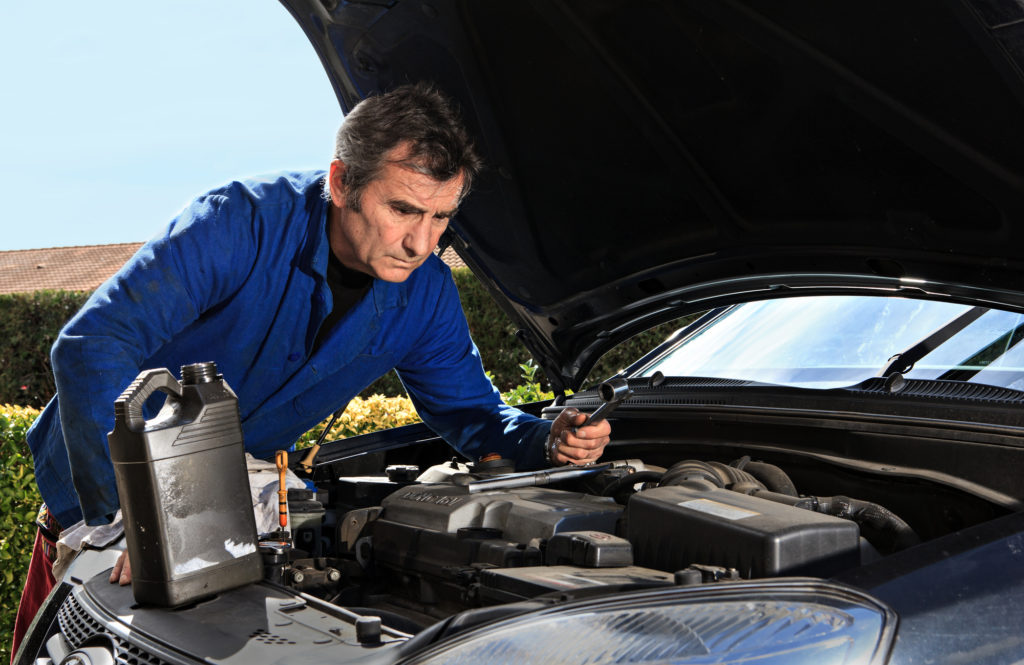
How to Fix High Oil Pressure in a Car
There are several ways to address a high oil pressure problem in your vehicle. The best advice is to bite the bullet and take your vehicle in for a checkup by your mechanic.
Here are a few simple solutions you can start with that may straighten up your high oil PSI problem.
Tools and Equipment Needed
For each of these tests or solutions, you will need different equipment. At a minimum, you should have:
- Rags
- Manual oil pressure gauge kit
- Multimeter
- Oil catch container
- Various other tools determined what process you are doing
Step 1: Check Your Oil Level
Start with checking the oil level in your vehicle. Sometimes, high pressure disappears with something as simple as this. If the oil pressure is low, add the proper oil to get it to the right level and get your vehicle in for an oil change as soon as you can.
Step 2: Check Oil Clarity
Your oil should be brownish-olive in color, but it should not be opaque. It should also not be dark brown or black. If it is not and you have high oil PSI, take your vehicle in for an oil change.
Step 3: Multimeter
A multimeter will check the function of the oil sending unit. Set the multimeter to take resistance readings by touching the black and red test leads to the wires on the sending unit while the vehicle is turned off. It should read about 240 ohms. Turn on the engine, and the ohms should drop to 33. If the ohm reading is correct, you have a pressure problem; if it is not, you have a sending unit issue.
Step 4: Oil Pressure Kit Test
You can also test your oil PSI with a test kit and gauge. Let the engine cool and rest. After an hour, turn on the engine (after putting the parking brake on) and locate the sending unit, which is usually by the oil pan. From there, follow the directions on your kit to determine if your sending unit pressure is normal.
Step 5: Change Your Oil and Filter
If the problem is your oil is fouled or the filter is malfunctioning, you can change both and possibly fix your problem. Once you have changed both out and installed a new filter, add oil that is recommended for your vehicle. Run the engine and see if the high-pressure issue returns.
Alternative: Take Your Vehicle to Your Mechanic
Unless you must do it yourself, this is the best step you can take to help diagnose the issue and fix it. Your mechanic is trained in diagnosing vehicle problems, has the right tools, and possesses the know-how to get to the root of your oil pressure issue and address it.
Can You Drive with High Oil Pressure?
Whether you can drive your vehicle with high oil pressure is secondary to the question of whether you should drive your vehicle with high oil pressure.
Can you gamble your high engine oil pressure is no big deal? Of course, you can. Chances are, realistically, since most oil pressure reading problems are the gauge or associated equipment, you can gamble and will probably win.
Or, you may lose a lot. The following are some of the possibilities that can be caused by high engine oil pressure:
- Parts of your engine are starved for lubrication and break
- The pressure damages seals in the engine, and those can start leaking
- Your engine overheats and stops functioning altogether
- Your engine becomes so damaged that it cannot be fixed or is not worth fixing
- You end up needing a new vehicle or to shell out thousands of dollars to fix your existing vehicle
Those realities versus letting a professional take a look at the problem and likely be able to quickly diagnose and fix it face you as you consider what you should do.

